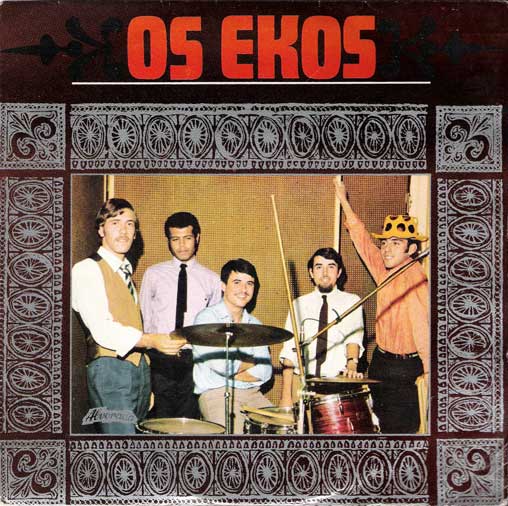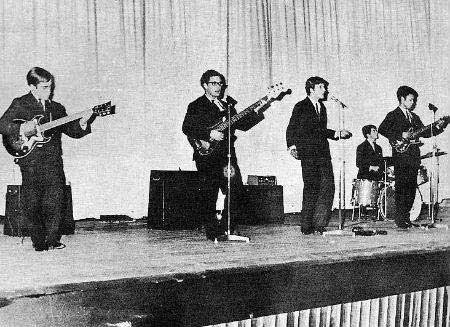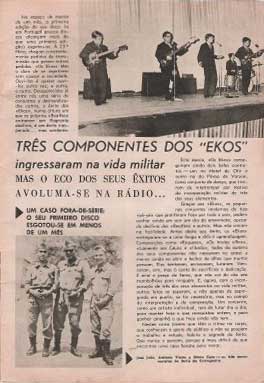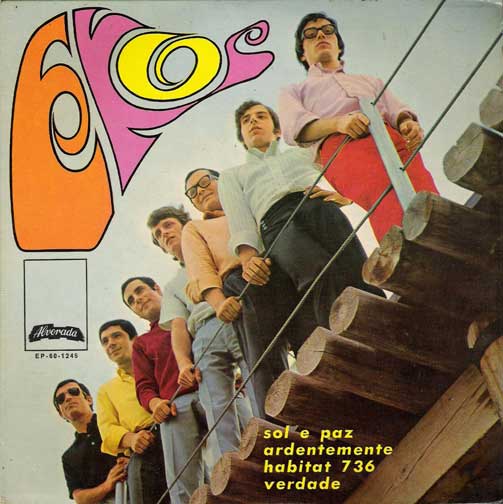
Formed by students in the Campo de Ourique section of Lisbon in 1964, they were originally led by their singer, Zé Luís. An important moment for the group came when they met Cliff Richard, who advised them to sing in Portuguese in order to distinguish themselves from other groups.
They started releasing records in 1965, hitting with pop fare like “Esquece” (Forget). In 1966 they competed in the Grande Concurso Yé-Yé (Great Yé-Yé Competition) held at the Teatro Monumental in Lisbon in 1966, placing fifth.
By the time of 1967’s “I Saw That Girl” they were trying a song in English again, with good results.
Os Ekos went through lineup changes as several members left to serve in the military in Angola, and the group wrote some songs about the colonial situation, some of which, like Sol e Paz, had their lyrics censored at the time. “Habitat 736” is one of these topical songs, their sixth and last record before breaking up in 1970.
Sources include: Thanks to Filipe, who sent in the scans and mp3s featured here. Info on Os Ekos from Vilar de Mouros 1971.



Great piece. Portuguese 60’s rock n’ roll is uncharted territory to most of the world as there hasn’t been a lot of “proper” reissue/compilation action of their scene. A great deal of Portuguese 60’s rock n’ roll was horribly behind the times (for instance a great deal of Shadows type bands were still cutting records in ’65-’67). There was a guy on MySpace who has/had a profile called “Portuguese Nuggets” who has some fascinating stuff up on the whole scene. And then there’s this Portuguese only gem:
http://anorakthing.blogspot.com/search?q=Tony+Jackson
Sorry for the second comment in a row and the length of this babble. My wife is Portuguese and my in laws reside there to this day. What I wanted to mention that most people are unaware that Portugal was ruled by a very conservative military dictatorship during the 60’s and young men were being drafted to go fight in Africa in Angola, Mocambique and Guine in droves. Like the U.S. Vietnam experience a small percentage tried to evade conscription, but strict immigration laws clamped down on this. Everything was censored, mail, television, radio and even phone conversations were liable to be listened in on by the dresded P.I.D.E (secret police), so of course there was little tolerance for “protest music” as such which makes these EP tracks even rarer. “Sol e Paz”, simply, means “Sun And Peace”, a subtle way of commentary. Because of the wars in Africa the country was impoverished (there was an embargo on arms by N.A.T.O. because of the oppressive/colonial regimes in Africa which forced the government to dedicate a great deal of their G.N.P. to the military which of course made for hard times). This explains why they were fewer record labels and records than most Euopean countries at the time, in fact the quality of most 60’s Portuguese rock n’ roll records of domestic artists I’ve seen are inferior to most other contemporary European releases (thin, brittle vinyl in some cases and almost tracing paper thin sleeves). For some reason M.O.R/pop records seemed to come in higher quality condition and were on “major” Portuguese labels. Of course Portuguese pressings by foreign artists on Portuguese imprints of foreign labels like CBS , Fontana or Pye were always top notch and like their French contemporaries at the time carried cool picture sleeves bearing artwork or photos not seen on UK or US issues.